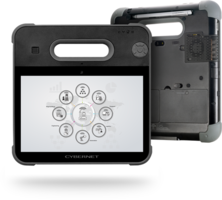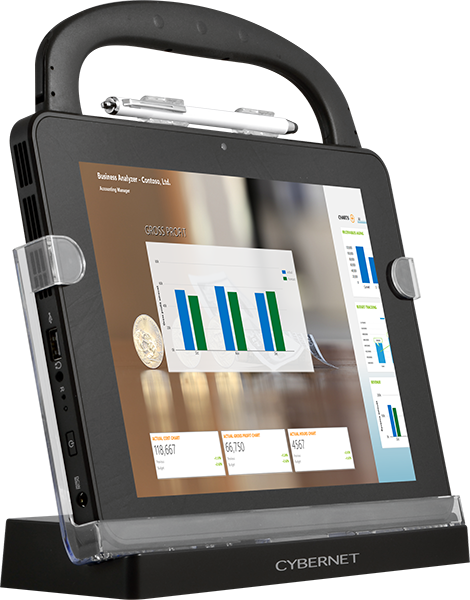Many businesses need a lightweight and flexible computer solution. Conventional PCs offer power and storage, but are too bulky to carry in a mobile workflow. What’s the solution?
The answer lies with business tablets. These devices offer performance in a compact package, making them perfect for a wide range of business applications.
Applications and Use Cases
Given the sheer variety of businesses and their requirements, business computer tablets must be capable of fulfilling a wide range of roles. Some of the most common use-cases for business tablets are:
Logistics and Inventory Management
Businesses must keep a close eye on their inventories, striking that balance between stocking too much surplus and too little. Business tablets are perfect for inventory management, especially when equipped with a built-in barcode scanner or RFID reader. These peripherals can scan the label on a package and automatically add or remove its contents from the business’s inventory. This simplifies inventory management and spares workers from having to update the inventory themselves.
Point of Sales Device
A point-of-sale (POS) device is used to process payments and record transactions. Whether used on a permanently mounted station or as a mobile device, a business computer tablet offers the processing power, wireless connectivity, and security that enable these purchases.
Field Work
Workers out in the field, such as delivery drivers or construction workers, need a way to update records, take notes, and communicate with other stakeholders. A computer tablet for businesses offers more processing power and greater functionality than a smartphone, making it perfect for this role.
Time-Keeping
With integrated biometrics and touchscreen interfaces, a computer tablet allows for accurate and reliable clock-in/out processes. This enhances employee attendance and time-keeping, ensuring that employees are accurately tracked and compensated for their work.
The Most Important Factors for Business Tablets
Like any other computer, business tablets are made up of multiple components that must operate in unison. Understanding how these different parts work together and what they can do for your business is essential.
Size
A tablet’s size can have a serious impact on how it’s used. A smaller tablet will obviously be lighter and easier to carry, which can be crucial if your workflow involves frequent movement. On the other hand, a larger tablet will have a larger screen, making it easier to review information, manage multiple programs, and type on its touchscreen.
Operating System
A tablet’s operating system supports every other program and application, making your choice of OS critical. Private consumers typically choose Apple’s iOS and Google’s Android for their personal smartphones. However, these operating systems are unable to support critical programs that many businesses need.
Connectivity
Another important factor is the tablet’s connectivity options, including both wireless and wired options. Given how ubiquitous they are, at least one or two USB ports should be considered mandatory. HDMI ports for connecting to monitors or projectors are also useful, as are NIC Ethernet ports that enable wired Internet access. Business tablets can also integrate legacy I/O ports, allowing them to work with older equipment and machinery, whereas consumer-grade models typically only include the latest forms of connectivity.
Peripherals and Add-ons
The best computer tablets for businesses come with integrated peripheral devices that expand their capabilities. Built-in cameras enable face-to-face communication even when working in different locations or sharing information over long distances. RFID readers and barcode scanners are especially useful, as they can automatically read labels and track the addition and removal of products from inventory. Even something as simple as a carrying strap or handle makes using the tablet easier and more comfortable for workers.
Security
Cybersecurity features are increasingly important for business computers, given that cybercrimes are more common and costly than ever. RFID scanners and barcode readers can be used for access control, ensuring that only authorized employees can use the device. Another priority is data encryption via services like Imprivata. These features ensure that even if hackers gain access to the data, they cannot actually use it.
The Advantages of Business Computer Tablets
Compared to conventional desktop PCs or off-the-shelf models, dedicated business tablets have numerous advantages. The most important of these include:
Smaller Size and Flexibility
The most obvious advantage that tablets have over a typical PC is their smaller size and portability. With a desktop PC, the worker is tied to that specific desk, which can be far too limiting in many workplaces. Being small and light enough to be carried in one hand means that a tablet can go with the worker wherever they’re needed. This means employees don’t have to sacrifice computer support for the sake of mobility.
Customization Options
Purchasing a consumer tablet off the shelf means you can only get it as-is, meaning you won't be able to make any customizations or alterations that you might need. A dedicated business computer tablet from an original equipment manufacturer (OEM) is a different story, however. OEMs can customize their products with built-in scanners, anti-glare filters for the display screen, and more.
Superior Reliability
Some business work environments, such as those in construction or manufacturing, can be extremely hostile to electronics. Threats such as dust clogging the tablet’s internal components or water damage can easily destroy your device. Dedicated business tablets feature rugged components, including fanless cooling and waterproof cases, which enable them to withstand harsh working conditions.
Steps for Choosing Your Business Tablet
Obviously, every business is different and will have different requirements for its computer tablets. However, there are certain universal steps that everyone should follow during the procurement process.
- What is the tablet’s intended purpose? Consider your operating environment and what challenges a computer tablet might face. If the workspace is particularly harsh, you should invest in a rugged design. If you intend to use the tablet for long periods of time without recharging, you may want to get a model with hot-swappable batteries, as these can be freely exchanged without interrupting your workflow.
- What do your end-users need? What do your employees need and want in a business tablet? Will weight be an issue as they carry the device throughout the day? Do they need a particular feature or add-on? Make sure you consult with them and take their desires into account. If possible, procure demo models for them to experiment with.
- What is your existing IT structure? Review your current workflow and the tools that you use. Are the programs you use compatible with your new tablet, or would you need to switch to something else? Could you afford this shift, or do you need a tablet that adapts to your needs instead?
Business Tablets from Cybernet Manufacturing
Integrating business computer tablets into your day-to-day operations can lead to massive improvements in workflow pace and flexibility. However, getting the most out of your devices requires selecting the right tablets from the right manufacturer.
If your company needs business tablets from a reputable source, contact the team at Cybernet Manufacturing. We’d be happy to go over how our tablets can be customized to better fit the needs of your business.

